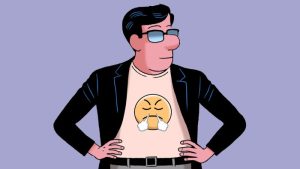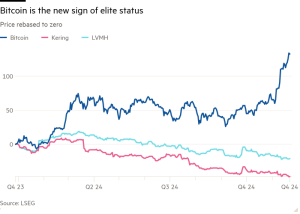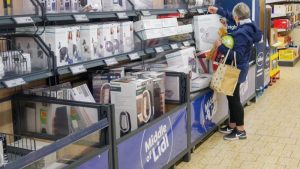Tackling period poverty in Lebanon’s refugee camps
Unlock the Editor’s Digest for free
Roula Khalaf, Editor of the FT, selects her favourite stories in this weekly newsletter.
Optometrist Nadirah Talati arrived at Ein el-Hilweh, the largest Palestinian refugee camp in Lebanon, in October 2021, to help treat eye problems. But, within weeks, she had identified another pressing need that had been left unaddressed: women’s menstrual health.
Lebanon’s sky-high inflation, amid a severe economic crisis, had pushed the cost of period products, such as sanitary pads, far beyond the reach of women and girls in the country’s refugee camps, forcing them into so-called period poverty. At the same time, they faced additional challenges, such as a lack of privacy and poor water supply, making it hard to ensure personal hygiene.
After a few visits to Ein el-Hilweh, Talati — working with the UK charity Jigsaw that had brought her there in the first place — began to distribute “dignity bags”, containing disposable sanitary pads, panty liners, nail cutters, shampoo and other basic hygiene items.
The 32-year-old from Bolton in north-west England recalls how, on one of the first occasions, one of the women laid out the contents of the bag in front of her and exclaimed: “This is the stuff we need, but we don’t get . . . people don’t think about this kind of stuff.”
Another woman, when asked what she used when she could not get hold of any pads, showed Talati a microfibre cloth that she kept in her tent. She also told her other women had resorted to newspapers, torn-up nappies and tissue paper — all of which increase the risk of infections. The choice was a stark one: food or sanitary products, the woman explained.
Jigsaw’s initiative pulled in other charities across the country, including Endless Medical Advantage, which provides healthcare services to refugees. “There’s still a stigma around periods for young girls and women,” explains Asma Patel, the director of EMA, who has been in Lebanon since 2019.
However, the situation is improving as the number of female doctors working with the charity increases, making women and girls more comfortable about discussing their health issues, the 39-year-old Londoner adds.

Education is also key. In June, Jigsaw, together with The Pachamama Project, a UK-based charity that aims to tackle period poverty, and Onoutha, a local women’s community initiative, launched the Dignity Project. This distributes reusable sanitary pads to women and their teenage daughters in the refugee camp in Arsal, a town close to the Syrian border. The recipients are given a talk by volunteers working for Onoutha on menstrual and reproductive health.
Mariam al Jabaly, the 24-year-old founder of Onoutha and a senior pharmacy student at the Lebanese International University, says her team educates girls and women aged from nine to 50 about menstrual hygiene, puberty, and menopause.
“Period poverty is not only a lack of access to menstrual products, it’s also about a lack of access to health information and menstrual hygiene management information,” says al Jabaly, who is from Lebanon’s Bekaa Valley. She stresses that everyone has the right to gain knowledge about their health and wellbeing without shame or boundaries.
“During the awareness session, we make sure that every girl gets this information in a way that we normalise according to their educational background, according to their age, and according to their culture,” al Jabaly says — adding that it is crucial that girls and young women do not have to miss school because they are menstruating and have no access to sanitary products.

This was the same inspiration for Ella Lambert, the founder and chief executive of The Pachamama Project. She was motivated to make pads having suffered from severe period pain from early adolescence, which forced her to stay home from school and miss other activities regularly.
The 24-year-old, from Chelmsford in south-east England, who founded Pachamama during the first UK Covid lockdown in 2020, said she decided to make the pads reusable for both continuity of supply — they last on average between three and five years — and to avoid the environmental impact of disposable menstrual products.
So far, Pachamama has made more than 120,000 pads and helped more than 16,000 women and girls around the world, including 7,500 in Lebanon, the charity’s largest project. The pads are made out of cotton, fleece and towelling material sourced predominantly from old stock in Britain that would otherwise be destined for landfill. “I don’t think any girl should miss out on the same education as her brothers simply because she has a period,” says Lambert.
#Tackling #period #poverty #Lebanons #refugee #camps







